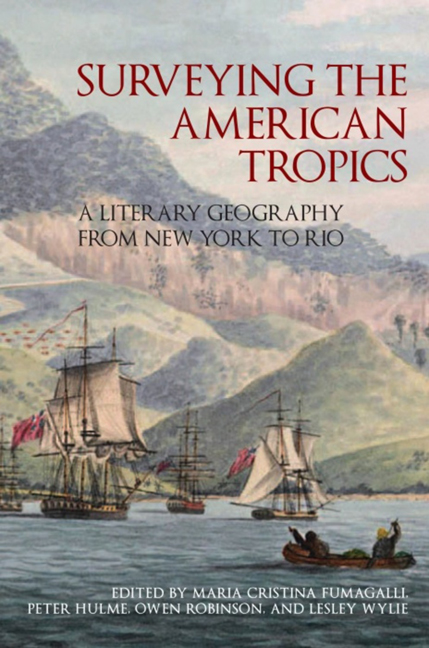Book contents
- Frontmatter
- Dedication
- Contents
- List of illustration
- Introduction
- A Tree Grows in Bajan Brooklyn: Writing Caribbean New York
- Reading the Novum World: The Literary Geography of Science Fiction in Junot Díaz's The Brief Wondrous Life of Oscar Wao
- Inventing Tropicality: Writing Fever, Writing Trauma in Leslie Marmon Silko's Almanac of the Dead and Gardens in the Dunes
- Imperial Archaeology: The American Isthmus as Contested Scientific Contact Zone
- Space Age Tropics
- Black Jacobins and New World Mediterraneans
- The Oloffson
- Dark Thresholds in Trinidad: Regarding the Colonial House
- Micronations of the Caribbean
- Golden Kings, Cocaine Lords, and the Madness of El Dorado: Guayana as Native and Colonial Imaginary
- Suriname Literary Geography: The Changing Same
- The Art of Observation: Race and Landscape in A Journey in Brazil
- Notes on Contributors and Editors
- Index
Imperial Archaeology: The American Isthmus as Contested Scientific Contact Zone
- Frontmatter
- Dedication
- Contents
- List of illustration
- Introduction
- A Tree Grows in Bajan Brooklyn: Writing Caribbean New York
- Reading the Novum World: The Literary Geography of Science Fiction in Junot Díaz's The Brief Wondrous Life of Oscar Wao
- Inventing Tropicality: Writing Fever, Writing Trauma in Leslie Marmon Silko's Almanac of the Dead and Gardens in the Dunes
- Imperial Archaeology: The American Isthmus as Contested Scientific Contact Zone
- Space Age Tropics
- Black Jacobins and New World Mediterraneans
- The Oloffson
- Dark Thresholds in Trinidad: Regarding the Colonial House
- Micronations of the Caribbean
- Golden Kings, Cocaine Lords, and the Madness of El Dorado: Guayana as Native and Colonial Imaginary
- Suriname Literary Geography: The Changing Same
- The Art of Observation: Race and Landscape in A Journey in Brazil
- Notes on Contributors and Editors
- Index
Summary
Panama—Potsdam
In the summer of 1847, while the US armies of Zachary Taylor and Winfield Scott were on their way to conquering Mexico City, the US adventurer and proto-archaeologist John Lloyd Stephens, famous ‘discoverer’ of many Maya ruins, joined the first US steamship voyage from Boston to Bremerhaven, being the official representative of the Ocean Steam Navigating Company, to whom the ship belonged. Although the steamer was beaten by its British rival, the Britannia, Stephens landed safely in Bremen, attended official dinners in celebration of the revolutionary technology that would introduce a new age of transportation, and went on a one-day trip to Berlin before continuing his journey to the river Rhine. As he writes, he only had one purpose in Berlin. With a written recommendation from the former Prussian minister to Washington in his pocket, he passed through the Brandenburg Gate and travelled on to Potsdam, where he heard to his chagrin that the object of his detour, the 78 year-old Alexander von Humboldt, was indisposed and would not receive anyone. Stephens left his card nevertheless, upon which he was instantly called into an adjoining apartment where Humboldt greeted him, saying that no introduction would have been necessary. Stephens, the expert at discovering the monuments of American antiquity, compares the aged aristocrat-scholar himself with a monument:
He was recorded in the annals of a past generation. Indeed, his reign had been so long, and his fame went back so far, that until I saw him bodily, I had almost regarded him as a part of history, and belonging to the past; even then, alone and in the stillness of the palace, I could hardly keep from looking at him as something monumental, receiving the tribute of posthumous fame.
Humboldt's manner of speech, rather than his mild accent, reminded Stephens of the American senior scholar Albert Gallatin, ‘who was an old personal friend’ of Humboldt, ‘and to whom he wished to be remembered’.
- Type
- Chapter
- Information
- Surveying the American TropicsA Literary Geography from New York to Rio, pp. 101 - 130Publisher: Liverpool University PressPrint publication year: 2013



